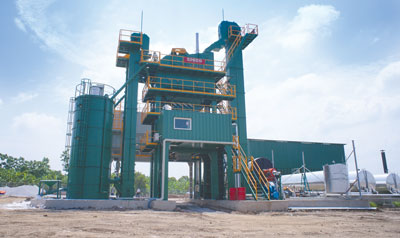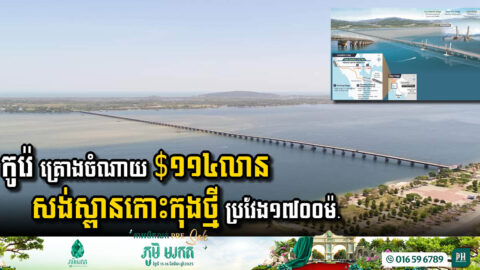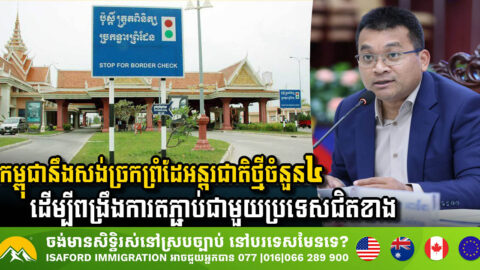រដ្ឋកំណត់យកភូមិល្វា ក្នុងខេត្តបាត់ដំបង អភិវឌ្ឍទៅជាភូមិគំរូគន្លឹះរបស់កម្ពុជា
ក្នុងជំហានដ៏សំខាន់មួយឆ្ពោះទៅរកការអភិវឌ្ឍន៍ជនបទ រដ្ឋាភិបាលកម្ពុជាបានកំណត់យកភូមិល្វាក្នុងខេត្តបាត់ដំបងអភិវឌ្ឍទៅជាភូមិគំរូសម្រាប់ភូមិដទៃៗទៀតនៅទូទាំងប្រទេស។ គំនិតផ្តួចផ្តើមនេះមានគោលបំណងលើកកម្ពស់កម្រិតជីវភាពក្នុងមូលដ្ឋាន និងលើកកម្ពស់ការអភិវឌ្ឍប្រកបដោយចីរភាពនៅជនបទ។ នៅថ្ងៃទី០៣ ខែមីនា ឆ្នាំ២០២៥ ឯកឧត្តម ឆាយ រិទ្ធិសែន រដ្ឋមន្ត្រីក្រសួងអភិវឌ្ឍន៍ជនបទ បានដឹកនាំគណៈប្រតិភូចុះពិនិត្យភូមិល្វា ឃុំល្វា ស្រុកបវេល ខេត្តបាត់ដំបង។ ការចុះត្រួតពិនិត្យនេះធ្វើឡើងតាមសំណើរបស់មន្ទីរអភិវឌ្ឍន៍ជនបទខេត្តបាត់ដំបង ដែលមានបំណងចង់ប្រែក្លាយភូមិល្វាទៅជាភូមិគំរូសម្រាប់ភូមិផ្សេងៗទៀតនៅទូទាំងប្រទេស។ ភូមិនេះ ស្ថិតនៅលើផ្ទៃដី ៥៦៤ហិកតា ក្នុងនោះមានផ្ទៃដីកសិកម្មចំនួន ៦៤ហិកតា ផ្ទៃដីសហគមន៍ជាង ១ហិកតា និងដីលំនៅដ្ឋានចំនួន ៤៦០ហិកតា។ ភូមិនេះមានផ្ទះចំនួន ៣៦៩ខ្នង ដែលអាចស្នាក់នៅបាន ៦១៦គ្រួសារ។ ហេដ្ឋារចនាសម្ព័ន្ធនៅភូមិល្វាមានភាពរឹងមាំ មានសាលារៀន មណ្ឌលសុខភាព ផ្សារ មជ្ឈមណ្ឌលសហគមន៍ពហុបំណង បណ្តាញផ្លូវថ្នល់ និងប្រឡាយចំនួនបី ដែលមានប្រវែងសរុប ២,៦ គីឡូម៉ែត្រ។ ជាងនេះទៅទៀត ភូមិល្វាមានទីតាំងនៅជិតទន្លេមង្គលបូរី ដែលអាចធានាបាននូវការផ្គត់ផ្គង់ទឹកប្រកបដោយស្ថិរភាព សម្រាប់កសិករក្នុងស្រុកធ្វើស្រែបានច្រើនដងក្នុងមួយឆ្នាំ។ ក្រសួងអភិវឌ្ឍន៍ជនបទមានផែនការក្នុងការអភិវឌ្ឍន៍ភូមិគំរូយ៉ាងហោចណាស់ឱ្យបាន៥០ ជារៀងរាល់ឆ្នាំរវាងឆ្នាំ ២០២៥ – ២០២៨ ដោយផ្តោតលើតំបន់ដែលមានសហគមន៍ជនជាតិដើមភាគតិច និងភូមិផ្សេងទៀតដែលបង្ហាញពីសក្តានុពល។ គំនិតផ្តួចផ្តើមនេះមានគោលបំណងបង្កើនចំនួនភូមិគំរូសរុបក្នុងប្រទេសកម្ពុជាដល់ ២៣០ នៅឆ្នាំ ២០២៨។(អានបន្ថែម) […]
ក្រុមហ៊ុនកូរ៉េ កំពុងសិក្សាសមិទ្ធិលទ្ធភាពគម្រោងសង់ស្ពានកោះកុងថ្មី តម្លៃ $ ១១៤លាន
ក្រុមហ៊ុនវិនិយោគធំៗមកពីកូរ៉េចំនួន០៥ បច្ចុប្បន្នកំពុងធ្វើការសិក្សាសមិទ្ធិលទ្ធភាពលើគម្រោងសាងសង់ស្ពាន កោះកុង និងការកែលម្អកំណាត់ផ្លូវជាតិលេខ៤៨ ដែលគ្រោងនឹងចំណាយថវិកាតម្លៃប្រមាណ ១១៤លានដុល្លារ ដើម្បីពង្រីកការតភ្ជាប់ពីក្រុងខេមរភូមិន្ទទៅព្រំដែនភាគខាងលិចនៃប្រទេសកម្ពុជា នេះបើយោងតាមលទ្ធផលនៃកិច្ចប្រជុំរវាងតំណាងក្រុមហ៊ុនកូរ៉េជាមួយរដ្ឋបាលខេត្តកោះកុង និងស្ថាប័នមន្ទីរពាក់ព័ន្ធ កាលពីថ្ងៃទី២០ ខែកុម្ភៈ ឆ្នាំ ២០២៥ កន្លងទៅថ្មីៗនេះ។ យោងតាមសេចក្តីព្រាងផែនការបឋមនៃគម្រោងនេះ ស្ពានកោះកុងថ្មីដែលនឹងត្រូវសាងសង់ឡើងមានប្រវែង ១៧០០ម៉ែត្រ ជាពីរ ២គន្លង និងមានទទឹងប្រវែង ១០ម៉ែត្រ ដែលត្រូវបានរចនាឡើងដើម្បីកែលម្អផ្លូវឆ្លងកាត់ព្រែកកោះប៉ោ។ បន្ថែមលើនេះ កំណាត់ផ្លូវជាតិលេខ៤៨ ដែលនៅសេសសល់ប្រវែង ៧,៨ គីឡូម៉ែត្រ តភ្ជាប់ពីគល់ស្ពានកោះកុងទៅដល់ព្រំដែនកម្ពុជាថៃ ក៏នឹងត្រូវកែលម្អទៅជាផ្លូវក្រាលបេតុង មាន ៤គន្លងផងដែរ។ ទោះយ៉ាងណាក៏ដោយ ប្រវែង ទំហំ និងទីតាំងជាក់លាក់នៃគម្រោងស្ពានកោះកុងថ្មីនេះ នៅមិនទាន់កំណត់ជាផ្លូវការនៅឡើយ ដោយសារគម្រោងនេះ កំពុងស្ថិតក្នុងដំណាក់កាលសិក្សា សមិទ្ធិលទ្ធភាពនៅឡើយ។ ប៉ុន្តែប្រភពពីលទ្ធផលនៃកិច្ចប្រជុំកន្លងទៅថ្មីៗនេះ បានបង្ហាញជម្រើស នៃការរចនាស្ពានថ្មីនេះ ចំនួនពីរ ដែលកំពុងស្ថិតក្រោមការវាយតម្លៃ៖ (១) ការពង្រីកស្ពានកោះកុងចាស់ ជាមួយនឹងគន្លងថ្មីពីរ ឬ (២) រុះរើស្ពានចាស់បច្ចុប្បន្ន ហើយជំនួសវិញដោយស្ពានបួនគន្លង ដែលមានលក្ខណៈទំនើបតែម្តង។ លើសពីនេះ ការកែលម្អផ្លូវក្រាលកៅស៊ូ និងរចនាសម្ព័ន្ធគន្លងកំពុងត្រូវ […]
បុរី ប៉េង ហួត ប្រកាសបើកលក់គម្រោងថ្មី ម៉ូតផ្ទះក៏ថ្មី ទំហំដីកាន់តែធំ តម្លៃរិតតែល្អពិសេស!!!
គម្រោងភូមិមរកតដែលក្រុមហ៊ុនបុរី ប៉េង ហួត ទើបប្រកាសបើកលក់ Pre-Sale កាលពីពេលថ្មីៗនេះ ត្រូវបានចាត់ទុកជាបេះដូង នៃតំបន់ផ្លូវ ៦០ម៉ែត្រ នៅភាគខាងត្បូងនៃរាជធានីភ្នំពេញ ដែលជាចំនុចតភ្ជាប់ទៅកាន់មហាវិថីសម្ដេចហ៊ុន នាង និងមហាវិថីសម្ដេច តេជោ ហ៊ុនសែន ជាពិសេសផ្លូវនេះគឺជាសរសៃឈាមនៃចរន្តសេដ្ឋកិច្ចនៅតំបន់ផ្លូវ ៦០ម៉ែត្រ និងជាផ្លូវសាធារណៈដែលធំជាងគេក្នុងរាជធានីភ្នំពេញ។ ក្នុងកម្មវិធីការបើកលក់ Pre-Sale នៅថ្ងៃទី១៥-១៦ ខែមីនា ឆ្នាំ២០២៥ ខាងមុខនេះ លោកអ្នកដែលកំពុងស្វែងរកគេហដ្ឋានក្នុងតំបន់ដ៏មានសក្តានុពលលើផ្លូវ ៦០ម៉ែត្រ នឹងទទួលបានឱកាសដ៏ចំណេញ ប្រូម៉ូសិនដ៏ពិសេសមុនគេ សំខាន់គឺអាចជ្រើសរើសទីតាំងផ្ទះល្អមុនគេតែម្តង។ ស្របគ្នានេះដែរ គម្រោងភូមិមរកតមានប្រភេទផ្ទះជាច្រើនជម្រើសសម្រាប់ការជ្រើសរើសរបស់លោកអ្នកចាប់តាំងពីហ្សបហោស៍នៅលើផ្លូវធំ វីឡាកូនកាត់ វីឡាភ្លោះ វីឡាទោលប្រណីតៗ និងមានអគារពាណិជ្ជកម្មស្ថិតនៅច្រកធំនៃគម្រោងតែម្តង។ លំនៅដ្ឋាននីមួយៗមានសស់ដីធំទូលាយ ការរចនាដ៏ទំនើប និងបរិក្ខារប្រណិត ដែលឆ្លុះបញ្ចាំងពីស្តង់ដារខ្ពស់បំផុតនៃការរស់នៅបែបទាន់សម័យ និងទំនើប។ ចង់ដឹងថាកម្មវិធីការបើកលក់ Pre-Sale គម្រោងភូមិមរកតនេះមានអ្វីពិសេស ទទួលបាននូវការផ្ដល់ជូនដ៏ពិសេសអ្វីខ្លះនោះ, សូមអញ្ចើញមកចូលរួមដល់ទីតាំងកម្មវិធី ដែលនឹងប្រព្រឹត្តទៅរយៈពេល ២ថ្ងៃ ចាប់ពីថ្ងៃនៅថ្ងៃទី១៥-១៦ ខែមីនា ឆ្នាំ២០២៥ មានទីតាំងនៅការិយាល័យលក់គម្រោងភូមិមរកត។ សម្រាប់ព័ត៌មានបន្ថែមអំពីកម្មវិធី សូមអញ្ជើញណាត់ជួបសហការីលក់របស់បុរី ប៉េង ហួត […]
ក្នុងឆ្នាំ២០២៤ ទំហំពាណិជ្ជកម្មរវាងកម្ពុជា-ថៃ កើនដល់ ១ម៉ឺនលានដុល្លារ
ក្នុងឆ្នាំ២០២៤ ទំហំពាណិជ្ជកម្មរវាងប្រទេសកម្ពុជា និងប្រទេសថៃ បានកើនឡើងរហូតដល់ ១០.០០០លានដុល្លារ ខណៈភាគីទាំងពីរ បានប្តេជ្ញាជំរុញទំនាក់ទំនងទំហំពាណិជ្ជកម្មទ្វេភាគីឱ្យមានសន្ទុះរិតតែខ្លាំងថែមទៀតនាពេលខាងមុខ។ នេះបើយោងតាមជំនួបពិភាក្សារវាងសម្តេចតេជោ ហ៊ុន សែន ប្រមុខរដ្ឋស្តីទីកម្ពុជា ជាមួយ ឯកឧត្តម ធុល ត្រៃសូរ៉ាត់ (Tull Traisorat) ឯកអគ្គរាជទូតវិសាមញ្ញ និងពេញសមត្ថភាពថៃ ប្រចាំកម្ពុជា នៅថ្ងៃទី១១ ខែមីនា ឆ្នាំ២០២៥។ ក្នុងជំនួបនេះ សម្ដេចតេជោ បានឱ្យដឹងថា ទំហំពាណិជ្ជកម្មរវាងកម្ពុជា និងថៃ ក្នុងឆ្នាំ២០២៤ កន្លងទៅនេះ បានកើនឡើងរហូត១០ពាន់លានដុល្លារ ធៀបឆ្នាំ២០២៣ ដែលមានត្រឹមតែ ៨ពាន់លានដុល្លារប៉ុណ្ណោះ។ សម្តេចតេជោ បានចាត់ទុកការកើនឡើងនេះបង្ហាញពីទំនាក់ទំនងពាណិជ្ជកម្ម ការវិនិយោគរវាងភាគីទាំងពីរក៏កាន់តែល្អប្រសើរ។ ជាមួយគ្នានេះ ឯកឧត្តម ឯកអគ្គរាជទូតថៃ បានប្តេជ្ញាបំពេញបេសកកម្មនៅកម្ពុជា ដោយយកចិត្តទុកដាក់ ធ្វើយ៉ាងណាក្នុងការពង្រឹង និតពង្រីកទំនាក់ទំនងរវាងប្រទេសទាំងពីរ ឱ្យកាន់តែល្អប្រសើរបន្ថែមទៀត ជាពិសេសការគៀរគរវិនិយោគិនថៃមកកម្ពុជាឱ្យកាន់តែច្រើនបន្ថែមទៀតផងដែរ។ បើតាមជំនួបពិភាក្សាដដែល ក៏បានបងញ្ជាក់ដែរថា ក្នុងឆ្នាំ២០២៤នេះ កំណើនភ្ញៀវទេសចរណ៍ថៃមកកាន់ប្រទេសកម្ពុជាមានការកើនឡើងដល់ទៅ ២លាននាក់ ដែលឈរនៅលំដាប់ទី១ ក្នុងចំណោមទេសចរណ៍បរទេស ហើយទេសចរណ៍កម្ពុជាទៅប្រទេសថៃវិញគឺ ប្រមាណ […]
កម្ពុជានឹងសង់ច្រកព្រំដែនអន្តរជាតិថ្មីចំនួន៤ ដើម្បីពង្រឹងការតភ្ជាប់ជាមួយប្រទេសជិតខាង
ដើម្បីជំរុញការតភ្ជាប់ក្នុងតំបន់ រដ្ឋាភិបាលកម្ពុជាគ្រោងនឹងបង្កើតច្រកអន្តរជាតិថ្មីចំនួន ៤ នៅខេត្តក្រចេះ តាកែវ ត្បូងឃ្មុំ និងរតនគិរី។ ការសម្រេចនេះត្រូវបានប្រកាសក្នុងកិច្ចប្រជុំកាលពីពេលថ្មីៗកន្លងមកដែលដឹកនាំដោយឯកឧត្តម ប៉េង ពោធិ៍នា រដ្ឋមន្ត្រីក្រសួងសាធារណការ និងដឹកជញ្ជូន ដែលប្រារព្ធធ្វើឡើងនៅថ្ងៃទី៣ ខែមីនា ឆ្នាំ២០២៥ ។ កិច្ចប្រជុំបានផ្តោតលើគម្រោងតភ្ជាប់ហេដ្ឋារចនាសម្ព័ន្ធឆ្លងកាត់ព្រំដែន ដែលផ្តល់មូលនិធិដោយធនាគារវិនិយោគហេដ្ឋារចនាសម្ព័ន្ធអាស៊ី (AIIB) ដែលមន្ត្រីក្រសួងបានពិនិត្យរបាយការណ៍បឋម និងពិភាក្សាអំពីទីតាំងសក្តានុពលសម្រាប់ច្រកព្រំដែនថ្មី។ ឯកឧត្តមរដ្ឋមន្ត្រីបានសង្កត់ធ្ងន់លើសារៈសំខាន់នៃការអនុវត្តគម្រោងនេះដោយជោគជ័យ និងតម្រូវការក្នុងការបង្កើតក្រុមការងារបច្ចេកទេស។ ក្រុមនេះនឹងធ្វើការស្រាវជ្រាវយ៉ាងម៉ត់ចត់លើកត្តាផ្សេងៗរួមទាំងការជ្រើសរើសទីតាំង តម្រូវការដី លក្ខខណ្ឌភូមិសាស្រ្ត លទ្ធភាព និងវិធានការចាំបាច់សម្រាប់ការរៀបចំ និងការចរចាដីធ្លី។ ទីតាំងដែលបានកំណត់សម្រាប់ច្រកទ្វារអន្តរជាតិថ្មី គឺត្រពាំងស្រែ ក្នុងខេត្តក្រចេះ ភ្នំដិន ក្នុងខេត្តតាកែវ ត្រពាំងផ្លុង ក្នុងខេត្តត្បូងឃ្មុំ និងអូរយ៉ាដាវ ក្នុងខេត្តរតនគិរី។ ក្រសួងសាធារណការ និងដឹកជញ្ជូន បានគូសបញ្ជាក់ថា ផ្លូវឆ្លងកាត់ថ្មីទាំងនេះ មានគោលបំណងពង្រឹងហេដ្ឋារចនាសម្ព័ន្ធច្រកទ្វារព្រំដែន និងសម្រួលពាណិជ្ជកម្ម និងការធ្វើដំណើរកាន់តែរលូនរវាងកម្ពុជា និងប្រទេសជិតខាង។ គំនិតផ្តួចផ្តើមនេះគឺជាផ្នែកមួយនៃយុទ្ធសាស្ត្រដ៏ទូលំទូលាយរបស់រដ្ឋាភិបាលកម្ពុជាក្នុងការកែលម្អហេដ្ឋារចនាសម្ព័ន្ធឆ្លងព្រំដែន ជំរុញកំណើនសេដ្ឋកិច្ច និងកិច្ចសហការក្នុងតំបន់។ - Video Advertisement -
វិនិយោគិនចិនមកពី ១៩ក្រុមហ៊ុន មានបំណងពង្រីកការវិនិយោគខ្លួននៅកម្ពុជា
នៅក្នុងការអភិវឌ្ឍន៍ដ៏សំខាន់មួយសម្រាប់ទិដ្ឋភាពវិនិយោគរបស់កម្ពុជា គណៈប្រតិភូដែលមានតំណាងមកពីក្រុមហ៊ុនចិនចំនួន១៩ បានមកជួបប្រជុំជាមួយក្រុមប្រឹក្សាអភិវឌ្ឍន៍កម្ពុជា (CDC) ដើម្បីពិភាក្សាអំពីឱកាសវិនិយោគដ៏មានសក្តានុពលនៅក្នុងប្រទេសកម្ពុជា។ កិច្ចប្រជុំនេះបានធ្វើឡើងនៅថ្ងៃទី១១ ខែមីនា ឆ្នាំ២០២៥ ហើយត្រូវបានដឹកនាំដោយលោក Liu Yong ប្រធានសមាគមអ្នកវិនិយោគវ័យក្មេងនៅក្នុងខេត្ត Yinan ទីក្រុង Kunming ប្រទេសចិន។ ក្នុងជំនួបនេះ ឯកឧត្តម ជា វុទ្ធី អគ្គលេខាធិការគណៈកម្មាធិការវិនិយោគកម្ពុជា បានស្វាគមន៍ចំពោះគណៈប្រតិភូ និងចំណាប់អារម្មណ៍របស់ពួកគេក្នុងការពង្រីកការវិនិយោគលើវិស័យផ្សេងៗក្នុងប្រទេស។ លោក Liu Yong បានសង្កត់ធ្ងន់ថា បច្ចុប្បន្នក្រុមហ៊ុនកំពុងធ្វើអាជីវកម្មលើវិស័យនានា រួមមាន កសិកម្ម សុខាភិបាល សំណង់ បច្ចេកវិទ្យា ថាមពល និងបដិសណ្ឋារកិច្ច ជាដើម។ សមាគមវិនិយោគិនវ័យក្មេង ដែលមានសមាជិកប្រមាណ ១.៥០០នាក់ ដែលមានចំណាប់អារម្មណ៍អាជីវកម្មចម្រុះ មានចំណាប់អារម្មណ៍ជាពិសេសលើការពង្រីកជំហានរបស់ខ្លួននៅក្នុងប្រទេសកម្ពុជា។ លោក Liu បានសម្តែងការប្តេជ្ញាចិត្តក្នុងការស្វែងរកឱកាសថ្មីៗ ជាពិសេសក្នុងវិស័យដូចជាការកែច្នៃកសិកម្ម រួមទាំងអង្ករ និងកៅស៊ូ ដើម្បីបំពេញតម្រូវការឧស្សាហកម្មក្នុងស្រុក។ ឯកឧត្តម ជា វុទ្ធី បានកោតសរសើរគណៈប្រតិភូចំពោះវិធីសាស្រ្តដ៏សកម្មរបស់ពួកគេ និងលើកទឹកចិត្តពួកគេឱ្យពិចារណាលើការវិនិយោគផ្សេងៗទៀត ដែលអាចផ្តល់ជាអត្ថប្រយោជន៍ទាំងក្រុមហ៊ុន និងសេដ្ឋកិច្ចកម្ពុជា។ […]



 English
English







